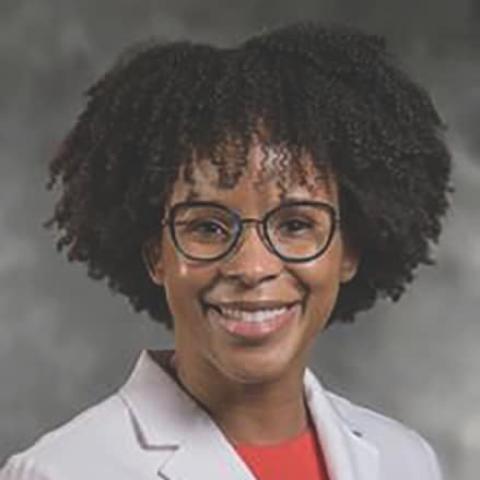Stroke patients with damage to the right side of their brains don’t ask a lot of yes-no questions. Although they commonly retain their command of language, people with right hemisphere damage (RHD) have trouble processing the information and assumptions that go into crafting such “polar questions.”
This is the type of observation driving Jamila Minga, assistant professor of head and neck surgery and communication studies at Duke’s School of Medicine. She is renewing the term “apragmatism,” first floated in the 1990s, to describe such deficits in pragmatic communication skills caused by RHD, and is building a database of symptoms as she pushes for a new diagnosis based on the term.

She underscores that apragmatism is not the same as aphasia. “Aphasia is a language disorder of both understanding and producing after a left hemisphere stroke,” she says. Patients with damaged right brain hemispheres often can generate speech and understand what they’re being told. But the extras surrounding speech aren’t controlled only by the left-hemisphere areas of the brain traditionally associated with language.
“I'm looking at your eyes, right?” Minga asks, during a conversation. “You're gesturing, right? And I can perceive that and understand that as signals to me to keep going with the communication. Well, individuals with right hemisphere stroke may not realize that – they don't get those nuances with the interaction, even though they can produce sentences and words just fine.”
Those pragmatic communication functions include tone of voice and context. “I enter the room of a patient that had a right hemisphere stroke,” she says, “and his wife is sitting right there. And he blatantly asks me to get into the bed with him. The inhibition is gone.” The patient could speak and understand just fine, but the common awareness not to give voice to a passing thought better left unsaid was gone. He wasn’t processing language just fine. Right hemisphere stroke survivors are perceived as being communicatively healthy. Minga wants a new diagnostic label because she believes they are not.
Minga’s research involves speaking with RHD survivors (and commonly their family members as control subjects), and she’s building “a database for the study of discourse production after right hemisphere stroke.” She’s developed a scripted protocol – specific questions to ask survivors – to create shareable data about apragmatism.

It is through that work that she has come to realize that RHD survivors rarely ask yes-no questions, which require advanced language processing to distill various perceptions into a single question. That is, vague questions require only basic language processing, but asking a specific yes-no question requires the stroke survivor to distill many pieces of communicated information down to a single question, and that’s a skill they often lack.
She also hopes as the diagnosis and protocol spreads, research can “leverage some of the data that’s existing. What can we learn from the existing MRIs that are part of the stroke protocol? And how can we use that in a very meaningful way?”
She’d like to see, she says, “a deluge of interest in researching right hemisphere stroke communication, so that we can advance it faster.”
